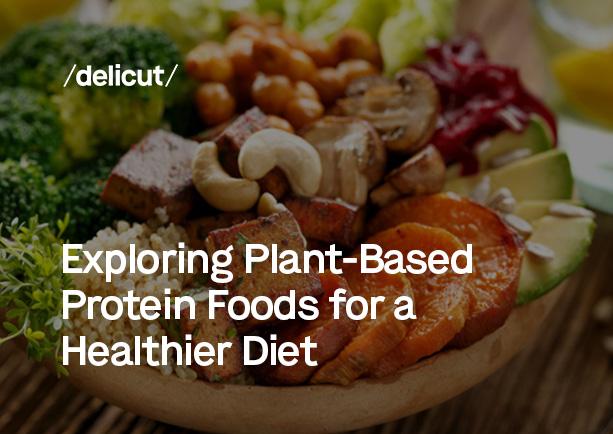Exploring Plant-Based Protein Foods for a Healthier Diet

When considering protein, many individuals associate it with foods like a succulent steak or a boiled egg. Nevertheless, it is vital to recognize that protein sources extend beyond animal-based foods.
Numerous plant-based foods offer a substantial amount of protein as well. Research indicates that incorporating a plant-based protein diet can help prevent diabetes and cancer.
Plant-based protein is vital in regulating elevated sugar levels and blood pressure, making it an essential component of the diabetes reversal diet plan. We highly recommend including plant-based protein foods in your daily meals.
This article provides all the necessary information, whether you aim to transition to a plant-based diet or wish to incorporate more plant protein into your meals. Get prepared to discover various plant-based protein sources that nourish your body and satiate your taste buds.
The Importance of Protein
Protein constitutes approximately 17% of our body weight, making it a crucial diet component. It is the building block for various body parts, such as muscles, skin, internal organs (including the heart and brain), eyes, hair, and nails.
Additionally, protein plays a crucial role in sustaining a robust immune system as it facilitates the production of infection-fighting antibodies. Furthermore, protein assists in regulating blood sugar levels and boosting energy production.
Protein-rich foods contain 22 natural amino acids, serving as the fundamental building blocks of protein. Nine amino acids are essential since our bodies cannot synthesize them independently, making obtaining them from our diet crucial.
Protein is a valuable source of minerals and vitamins, such as zinc and B. Therefore, seeking plant-based protein sources is essential for optimal nutrition and well-being.
Benefits of Consuming a High-Protein Plant-Based Diet
A plant-based protein diet offers numerous advantages for overall health and well-being. Some of the key benefits include:
Adequate Protein Intake
By following a high-protein plant-based diet, you can ensure sufficient protein intake without relying on animal products. This diet provides the essential amino acids for tissue repair, muscular growth, and maintaining body functions.
Weight Management
Including protein-rich foods in your diet can promote a sense of fullness, aiding in weight management. There are numerous plant-based protein diets designed for weight loss that effectively control appetite and reduce cravings.
Heart Health
Plant-based protein sources frequently have lower cholesterol levels and saturated fat. By lowering LDL cholesterol levels, a diet high in protein-rich vegetarian foods can help lower the risk of heart disease.
Digestive Health
Several plant-based protein sources, such as legumes, whole grains, and fruits, are fiber-rich. Fiber is essential for digestion, avoiding constipation, and promoting good gut bacteria development.
Disease Prevention
Research has demonstrated that adopting a high-protein, plant-based healthy diet reduces the risk of developing chronic illnesses such as type 2 diabetes, obesity, and heart disease. The diet's abundance of antioxidants, vitamins, minerals, and phytochemicals accounts for these positive outcomes.
Nutrient Diversity
Various needed nutrients, such as vitamin C, vitamin E, folate, potassium, magnesium, iron, and antioxidants, are found in plant-based protein sources.
Top Sources of Plant-based Protein
In today's health-conscious world, plant-based diets are gaining immense popularity for their numerous benefits, from reducing environmental impact to promoting well-being. If you're considering or already following a plant-based lifestyle, you'll be pleased to know that abundant protein sources are available beyond the animal kingdom.
Here are the top sources of plant-based protein that provide the essential amino acids your body needs and add delicious variety to your meals.
Lentils
Lentils are one of the richest plant-based protein sources, providing substantial protein essential for muscle strength and growth. For people adhering to a vegetarian or vegan diet, they serve as a fantastic substitute for animal-based proteins.
Moreover, lentils offer a generous fiber supply, supporting healthy digestion and promoting a lasting feeling of fullness. Considering these benefits, incorporating lentils into our meals can be a wise choice to maintain good health and meet our body's protein needs.
Chickpeas
Chickpeas, also known as garbanzo beans, stand out as one of the top plant-based protein foods. These small legumes are packed with a wealth of essential nutrients, making them a fantastic addition to any diet. Their high protein content is vital in supporting muscle growth and overall well-being.
Chickpeas are a rich dietary fiber source crucial in supporting digestion and maintaining a healthy gut. Moreover, they are abundant in essential nutrients such as folate, iron, phosphorus, and healthy fats, contributing significantly to overall nourishment and vitality.
Kidney beans
Kidney beans are a nutrient-packed powerhouse that provides numerous benefits for our bodies. Just a ½ cup serving of kidney beans provides substantial protein, making them a valuable addition to a healthy diet.
Besides protein, these beans are rich in fiber, iron, folate, and other essential minerals, enhancing their nutritional value. They possess the capacity to reduce cholesterol levels, regulate blood sugar, and control blood pressure.
Green Peas
As a prime protein option for vegetarians, green peas also pack essential nutrients. A single serving of green peas fulfills the requirements for around 25% of daily fiber, thiamine, folate, manganese, and vitamins A, C, and K. Furthermore, they provide significant amounts of copper, zinc, phosphorus, iron, magnesium, and various B vitamins. All these qualities combined make green peas an exceptional choice as a protein-rich vegetarian food.
Soybeans
Soybeans offer a healthy food choice among protein options for vegetarians. In addition to being a great source of protein, they also provide essential nutrients such as fiber, iron, calcium, and vitamins.
Incorporating 2-4 servings of soy foods into your daily diet can yield numerous health benefits associated with soy. Therefore, consider including soy protein as a wholesome addition to your protein-rich vegetarian diet without hesitation.
Tofu
Including soy in your diet offers various options, and one of them is tofu, a remarkable meat substitute that delivers 9 grams of protein in a 3-ounce serving. Tofu is a heart-healthy choice due to its low cholesterol and saturated fat content.
Moreover, it provides essential nutrients like calcium, iron, and critical amino acids. Tofu's versatility suits diverse dishes like stir-fries, salads, and soups. Its mild flavor seamlessly blends into any culinary creation, absorbing various flavors and spices effortlessly.
Quinoa
Quinoa, a versatile seed in white, red, black, and mixed varieties, stands out as a delicious and high-calorie option among vegetarian foods. Cooked quinoa provides over 4g of protein per 100g meal, making it an excellent plant-based protein source.
It contains all 22 essential amino acids that our bodies require. Also, quinoa is rich in vitamins, minerals, and dietary fiber, enhancing its nutritional value.
Chia Seeds
Chia seeds pack a powerful punch in terms of protein content, with approximately 2g of protein in just one spoonful. By incorporating these healthy seeds into your recipes, you can elevate the protein content of many dishes.
Not only do chia seeds enhance the nutritional value, but they also contribute to the texture of your meals. If you're seeking the best plant-based protein diet, consider adding chia seeds to your daily culinary repertoire.
Flaxseeds
Flaxseeds, small and delectable, offer numerous health advantages. They serve as excellent natural protein sources for vegetarians, providing a substantial amount per serving. In addition to protein, flaxseeds are abundant in essential omega-3 fatty acids, fiber, vitamins, and minerals. You can consume these nutrient-dense seeds in various forms, such as flaxseed oil or ground flaxseed.
Sesame Seeds
Incredibly nutrient-dense, these tiny seeds are rich in protein, playing a crucial role in building and repairing tissues in our bodies. Sesame seeds offer a valuable protein source for those following a vegetarian or vegan diet. You can enhance the crunch and nutrition of your meals by sprinkling sesame seeds on salads or baked goods.
Sprouts
Sprouts provide an excellent source of plant-based protein, offering numerous health benefits when included in your diet. Sprouts are nutritious and packed with essential nutrients and enzymes. Moreover, sprouts are rich in amino acids vital for muscle growth, healing, and overall body function.
With a complete protein profile and easy digestibility, these tiny protein powerhouses can help you effectively meet your daily protein requirements when incorporated into your meals.
Almonds
Almonds serve as the finest vegetarian source of healthy fats while supplying your body with protein and other essential nutrients. The presence of unsaturated fats in almonds supports heart health.
Incorporating almonds into your breakfast routine allows you to meet your protein requirements while enjoying the benefits of wholesome fats. Hence, adding almonds to your plant-based diet can be a wise choice to ensure an adequate protein intake.
Pistachios
Pistachios offer another excellent high-protein plant-based food, contributing to your overall health. Like almonds, they contain unsaturated fats, fiber, vitamins, and minerals. Including pistachios in your diet can enhance digestion, support healthy cholesterol levels, and induce a sense of fullness. Nonetheless, it is essential to be mindful of portion sizes, as they are calorie-dense.
Spinach
Spinach, a leafy green vegetable, provides substantial protein and a rich array of essential vitamins and minerals. Moreover, it is low in calories and fiber, promoting a sense of fullness and aiding digestion.
Additionally, spinach is abundant in iron, calcium, vitamin C, and other healthy nutrients. Its delightful taste makes it a perfect addition to salads and stir-fries and as a side dish preparation.
Pumpkin Seeds
Pumpkin seeds rank among the healthiest and finest plant-based protein sources. Rich in protein, beneficial fats, fiber, vitamins, and minerals – including magnesium, iron, zinc, and omega-3 fatty acids – these elements support a range of bodily functions.
Additionally, pumpkin seeds are renowned for their antioxidant properties, protecting your cells against damage caused by free radicals.
Conclusion
In our journey through the world of plant-based protein foods, we've discovered a vibrant array of options that support a healthier diet and open the door to culinary creativity. These foods offer essential nutrients and help reduce our environmental footprint.
Whether you're fully embracing a plant-based lifestyle or simply seeking to diversify your diet, these protein sources are worth celebrating.
Remember, the key to a successful plant-based protein diet is variety. Experiment with different ingredients, flavors, and cooking methods to keep your meals exciting and satisfying. By doing so, you'll not only nourish your body but also contribute to a more sustainable and compassionate world. So, let's continue to explore, savor, and share the delights of plant-based eating for a healthier you and a healthier planet.
FAQs
1. What are plant-based protein foods?
Plant-based protein foods come from plants, including legumes (beans, lentils), nuts, seeds, tofu, tempeh, quinoa, and select vegetables.
2. What foods have the most plant-based protein?
Foods with the most plant-based protein include legumes (such as lentils and chickpeas), soy products (like tofu and tempeh), quinoa, nuts and seeds (like almonds and chia seeds), and certain vegetables (like spinach and broccoli).
3. Which plant-based protein is best?
No single "best" plant-based protein exists; each source offers unique benefits. Legumes, including beans and lentils, are highly regarded for their rich protein and fiber content. Soy products like tofu and tempeh provide complete proteins with essential amino acids.
Quinoa is notable for being a complete protein and containing various nutrients. Nuts and seeds offer protein along with healthy fats and other nutrients. The best choice depends on individual dietary preferences and nutritional needs. Variety is key to obtaining a well-rounded plant-based protein intake.
4. What is a famous plant protein?
One famous plant protein is tofu.
5. What are 5 plant-based foods?
Spinach, Lentils, Almonds, Quinoa, and Broccoli are five plant-based foods.
Read More:
The Link Between Diet and Mental Health: Foods for a Happy Min
Healthy Food Swaps: Small Changes for Big Health Benefits
Healthy Snack Ideas to Fuel Your Workday
Related Blogs
The Burnout Diet
Jan 30, 2026 | 8The mental load of “What should I eat today?"
Jan 22, 2026 | 8The real glow-up starts with your gut health
Jan 14, 2026 | 8Healthy food that doesn’t taste like “Diet Food”
Jan 17, 2026 | 8Why do most people in the UAE get their calories wrong
Dec 8, 2025 | 6DASH Diet Meal Plan
Nov 11, 2025 | 8Fatty Liver Meal Plan
Oct 31, 2025 | 8Pregnancy Diet Meal Plan
Oct 27, 2025 | 82000 Calorie Meal Plan
Oct 1, 2025 | 8Intermittent Fasting Diet Plan
Sep 5, 2025 | 8






